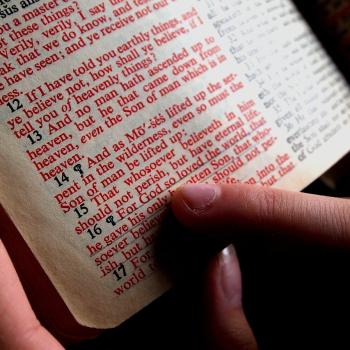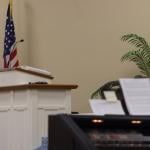One of the scariest passages in the Bible is Matthew 7:21–23. It is spoken by Jesus: “Not everyone who says to me, ‘Lord, Lord,’ will enter the kingdom of heaven, but the one who does the will of my Father who is in heaven.” The text speaks about judgement day in which “many” will say on that day to Jesus “Lord, Lord, did we not prophesy in your name, and cast out demons in your name, and do many mighty works in your name?” To which the Lord will say to them, “I never knew you; depart from me, you workers of lawlessness” (Matt 7:22–23 ESV).
What is frightful is that there will be many who call Jesus Lord on that day but will be denied entrance into the kingdom of heaven. At final judgement, this presumably means there will be a large number of those who profess to be Christians whom Christ will reject. This includes even those who have apparently done spectacular miracles. Being charismatic is no guarantee of entrance!

Wide is the gate that leads to destruction, narrow is the gate that leads to life
Another disturbing aspect is that prior to this, Jesus speaks of two ways that are set before the audience of his sermon—the wide path that leads to eternal destruction and the narrow path that leads eternal life (Matt 7:13–14; cf. Luke 13:23–30). “Many” will go down the wrong path and into the wrong gate, and “few” find the right way. Ulrich Luz brings this out in a sobering manner by comparing Matt 7:13–14 with the “many” in Matt 7:22 who call Jesus Lord but do not enter God’s kingdom:
“The many who go on the broad way are for him [Matthew] obviously not only the Jewish scribes, not only Israel’s majority that does not follow Jesus, not only the ‘others’ from whom one has separated, or, as in the Didache, the unbaptized whose way one has abandoned by being baptized; the ‘many’ are Christians, members of the community… The community is on the move; it is on the way that leads to life. It is constantly faced with the choice of the two ways. Being a Christian and being baptized does not mean that one has the comforting assurance of salvation; it means that one has the chance of being confronted daily with the choice between the broad way and the difficult ways of the Sermon on the Mount [in Matthew 5–7]” (Ulrich Luz, Matthew, 1.372).
So why will so many apparent Christians be excluded at final judgment?
Matthew 7:22–23 (and 7:13–14) share some common thoughts with Luke 13:24–27: Those who are rejected in Luke’s version seem to be the unfaithful of the towns and villages where Jesus preached on his way to Jerusalem; they ate and drank with him but did not really follow him (Luke 13:22, 26). Unlike those who are rejected in Matthew 7, they do not perform any miracles, and they are workers of “unrighteousness” (ἀδικία: Luke 13:27), whereas in Matthew they work “lawlessness” (ἀνομία).
Here we gain two ideas of why the Lord rejects them. First, they do not really follow Christ regardless of professing him as Lord. In other words, they have not really surrendered their lives to follow Jesus in a way that pleases him. Second, they work unrighteousness and lawlessness. As such, they do not do the will of God the Father. In other words, their immoral behavior contradicts their confession as Christians.
A person’s position in or out of the kingdom of heaven is contingent upon their doing the Father’s will. Consequently, the false prophets are practicing lawlessness, not necessarily teaching a collection of false doctrines independent of moral precepts. The righteous, on the other hand, produce good fruit by doing God’s will (obeying God), which means that they work righteousness and put to practice the law of Jesus, especially his teachings in the Sermon on the Mount (Matthew 5–7, esp. 7:12).
Such a view is not incompatible with what Paul claims—the practice of various sinful deeds can exclude a person, even those who profess to be Christians, from God’s kingdom (Galatians 5:19–21; 1 Corinthians 5:9–10; 1 Corinthians 6:9–10; Romans 1:25–32; Ephesians 5:3–5; cf. Revelation 21:8).*
False Prophets
Even so, the “many” who are rejected in Matthew 7:22 are not exclusively Jews, Gentiles, nominal Christians, or apostates. They seem to identify false prophets who speak in Jesus’ name, as the context suggests (Matt 7:15–23). In the Olivet discourse there will be “many” such prophets and deceivers arising before the end takes place (Matt 24:11).
The false prophets respond to Jesus with the double vocative “Lord, Lord,” which functions as an emphatic appeal. When “Lord, Lord” is addressed to Jesus, it is found on the lips of those who are disobedient to him and are excluded from his community (Matt 25:11; cf. Luke 6:46). It may function as a rhetorical device that points to the reversal of God calling an individual: recall “Abraham, Abraham,” “Moses, Moses,” or “Saul, Saul.” The disobedient who use the double vocative in Matthew’s gospel are disowned, dishonored, and excluded from God’s kingdom.
The false prophets’ punishment involves departing from the Lord’s presence (Matt 7:23; cf. 25:41). The phrase, “depart from me …,” echoes Psalm 6:8–9 and is originally directed against the psalmist’s enemies who are workers of lawlessness. The Septuagint version of the Psalms frequently associates “workers of lawlessness” with enemies who persecute God’s people or the psalmist and will be punished. Matthew’s allusions to the Psalm suggest that the ones who are being judged practice lawlessness and will be punished as God’s enemies. They are in essence sentenced to hell (Matt 13:41–42; 23:28, 33–36; cf. 24:12; 2 Thess 2:3, 7–12).
I Never Knew You
Jesus also says to them, “I never knew you; depart from me, you who practice lawlessness” (Matt 7:23). Variations of this declaration may have been spoken as excommunication formulae in which the general meaning is probably, “I do not wish to have anything to do with you.”**
Nevertheless, their being denied access to the kingdom of heaven may be related to Jesus declaring that he will deny those who deny him (Matt 10:33; cf. Luke 12:9), and so “I do not know you” would seem to suffice (cf. Peter’s denials in Matt 26:70, 72, 74). The nuance given in Matthew 7:23 is that Jesus “never” (οὐδέποτε) recognized as his own the ones he is excluding. The perspective that they never belonged to Jesus seems correct. If so, the false prophets in this passage may be characterized as inauthentic—they were never truly followers of Jesus.
Differently, the claim “I do not know you” in the Parable of 10 Virgins (Matt 25:12) may suggest a previous fellowship with the bridegroom. The virgins are not false prophets; they may represent Christians unprepared for the second coming of Christ (see further, Oropeza, In the Footsteps of Judas, 48–97, esp. 88–91, from which much of this information was derived).
Reflection
May we be among those who enter the kingdom of God at final judgement. Are we living in obedience to the Lord Jesus, not simply with our words but with our actions and moral behavior? May we heed the warning from Jesus: “And why call you me, ‘Lord, Lord,’ and you do not do what I say?” (Luke 6:46)
Notes
* See B. J. Oropeza, Jews, Gentiles, and the Opponents of Paul: The Pauline Letters (Eugene: Cascade, 2012).
** See Matt 25:12; cf. 10:32; 18:15–20; Luke 12:8; 2 Clem 4.5; 4Q175 15–17. Also, T. W. Manson, Sayings of Jesus, 125, 177.













